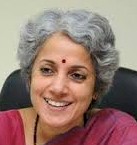The Indian Council of Medical Research (ICMR) wants a greater push on clinical trials of existing medicines used to treat tuberculosis, malaria and cancer among other prevalent diseases in the country to stem a noticeable decline in overall clinical work in those areas in the past three years.
India has seen a drop in clinical trials since 2012 following a public interest case that went to India's Supreme Court that raised questions on informed consent and related ethical guidelines for compensation in the event of injury or death.
The Tribune newspaper however said that ICMR has written to the Drug Controller General of India (DGCI) to seek rule changes that allow quicker trials for existing medicines in key disease focus areas.
In particular, ICMR said approval from the drug regulator should only be needed for work that leads to the registration of a new product, and not for trials that involve academic research for dosage or related changes.
 |
| Soumya Swaminathan |
"The ICMR is working with the DGCI and the Ministry of Health to clarify some rules and regulations on clinical trials issued after 2012," Soumya Swaminathan, ICMR Director General and Secretary, Health Research, told the Tribune.
"The idea is to clarify these rules without diluting standards or compromising the safety of subjects who enroll for the trials. So, we are saying that the DGCI needs to approve only those trials which will lead to the creation of a new medicine, product and research on existing treatments to improve their efficacy would be left out of the regulatory net."
ICMR and advisory boards work with the government to set standards for ethics committees on clinical trials, following good clinical practices (GCP) guidelines, but many in the industry say that the 2012 push for DGCI approvals in areas such as dosage changes overburdens the regulator and leads to slower work in areas of urgent medical need.
"India continues to bear a huge burden of TB and malaria and we need to work on simplified and effective treatment regimens for these," Swaminathan told the Tribune.
"Similarly, we need to boost clinical research for Kala azar (leishmaniosis), cancer, hypertension and other basic conditions. After the new clinical trial guidelines came into force in 2012, we witnessed a significant decline in the number of academic research trials for existing diseases. We want to arrest this worrisome trend."
The Tribune said India currently has 6,520 clinical trials in progress.
In a separate report released this month, the Indian Society for Clinical Research (ISCR), an industry body which includes multinationals and CROs, said it has advocated a central online filing system in India--akin to clinicaltrials.gov in the United States--and a process of pre-submission meetings with the Drug Controller General of India.
In the case of new drug development, ISCR has also used a more robust system of informed consent that includes video and audio recordings of potential patients, particularly those that are considered "vulnerable" because of language or other barriers.
- here's the story from the Tribune